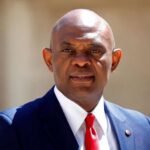
On October 16, Minister of Sports Development John Enoh stated that Nigeria’s football legislation should be adaptive to the uniqueness of the country’s composition and factors peculiar to it.
Enoh stated this during a strategic meeting with the executive board of the Nigerian Football Federation in Abuja.
“If FIFA recognises the unique situations in each country (as mentioned), then the NFF does not need to wait for the universal statute (of FIFA), as it may not cover those unique situations and we may not have control of the timelines,” the minister said in a statement signed by his media office.
“NFF should submit the action plan leading to the final amended statute with definite timelines to the Office of the Minister of Sports Development, as we need to make progress and bring this to a positive conclusion.”
While the country’s teeming football enthusiasts hailed Enoh’s move, saying it was the right step in the right direction, others drew the minister’s attention to the age-long issue issue of the legal status of the NFF.
They insisted that the NFF was illegal, adding that what was known to the Nigerian law was the Nigeria Football Association.
The stakeholders urged the minister to address the issue, saying it would ensure the smooth administration of football in Nigeria, which they claimed had been in an epileptic state because of the alleged illegal status of the NFF.
They called on Enoh to ensure that the football body obeyed the landmark judgment by Justice D.U. Okorowo of the Abuja High Court, which outrightly declared the NFF illegal in 2010.
While delivering the judgment in suit number FHC/ABJ/CS/179/2010, Justice Okorowo stated, ”As set out in the early part of this judgment, the Nigeria Football Association was established under Section 1 of the Nigeria Football Association Act as a body corporate with perpetual succession and common seal with power to sue and be sued.”
The judgment added, ”By these provisions, it is the only body recognised by Nigerian Law to manage football. The Law did not make reference to it as Nigeria Football Federation. The name under which it is charged to manage football under the Law is Nigeria Football Association. It has no power to address itself as Nigeria Football Federation. And the document titled Nigeria Football Federation Statute, which purports to confer the name Nigeria Football Federation to Nigeria Football Association is not a codified Law under the Laws of Federation of Nigeria. It is therefore illegal for the Nigeria Football Association to answer another name other than the name by which it is created as a legal entity.”
Veteran sports journalist and analyst Ben Memuletiwon faulted the minister’s move regarding the expansion of the NFF congress, saying the right step should have been to address the legal status of the NFF.
“I think the minister is taking the wrong step and it shows that the man has not even read a single file on his table because if he had, he should know that increasing the congress is not the issue he should address now. It’s like trying to treat ringworm instead of leprosy. The problem of NFF is not statutes, it is whether NFF is illegal or not,” Memuletiwon told The PUNCH.
“The Okorowo judgment that declared NFF illegal is there, and that is where the Football Administration Act of 2004 stands; that it’s an aberration for NFA to change its name from NFA to NFF. We should address that first, either to legitimise the NFF by telling the National Assembly to enact a law that will turn it to NFF or to tell the Ibrahim Gusau-led board outright that they should revert to NFA, thats the biggest trouble now, not the statutes. Do you think the statutes will work?”
Former Gombe State FA chairman, Shuaib Gara-Gombe, added, “It still remains that they are operating as NFF illegally and I’ve been saying that. What the minister sent to them shouldn’t have been in the media. The minister is giving them one year to expand the congress, thats a wrong move. Thats where they start bringing this issue of interference. It happened under former ministers Solomon Dalung and Sunday Dare.”
Our findings show that following Justice Okorowo’s judgment, the Federal Ministry of Justice, in a clarification letter to the then Director-General, National Sports Commission on June 2, 2011, noted that the NFF was unknown to the laws of the land, stating, “The Nigeria Football Association Act 1990 (aka Decree 101) has neither been repealed nor amended, it remains the valid legal instrument for the administration of football in Nigeria.”
The letter added, “In the light of the above recognition of the private status of the NFF, the ordinary implication is that the body is not entitled to the receipt of statutory allocations from the Federal Government.
“As a ‘private association’, the NFF is entitled to raise funds as averred in paragraph 3(vi) of the affidavit for its operations in line with relevant FIFA regulations. However, except the government decides to give grants-in-aid to the federation in the national interest, there will be no legal basis for the NFF to draw funds from the government for its activities.
“The present situation suggests that the structure for the administration of football in Nigeria at the moment is legally unwieldy as the NFA, which is statutorily recognised is non-functional, while the NFF, which is not a creation of our laws, is from all indications running football in the country and receiving public funds albeit unconstitutionally.”
Despite the clarification by the justice ministry, that the NFF was not entitled to the receipt of statutory allocations from the Federal Government following its ‘private association status’, the FG has remained a major funder of the body, which Memuletiwon described as an anomaly.
“Nigeria is a country where nothing works,” Memuletiwon added. “After the Justice Okorowo judgment of 2012, the Ministry of Justice wrote to the sports ministry that they should stop subvention to the NFF and the then Director-General, National Sports Commission, Dr Patrick Ekeji, stopped their subvention for four months. He didn’t give them one Naira for four months. He told the NFF officials to do the right thing, to change the name, if they wanted to get the money from government. They went to the sports minister then Yusuf Sulaiman. Some people begged Ekeji to release the money, I was there. We spoke to him and said, ‘Look Ekeji, there’s a way we can do this, just release their money.’ That was why Ekeji released their four months subvention then. The letter from the justice ministry to stop the subvention is still there.
People don’t respect the law here. NFF officials are doing this because they don’t want to be controlled by the ministry.
“Before it changed from association to federation in 2008, the secretary was from the ministry, which supervised their money. They couldn’t send money without the ministry’s approval. But since they changed to NFF, they hire their own secretaries and spend their own money. The government has no control over them but if the secretary is sent there by the ministry, definitely he’ll be loyal to the ministry.”
The controversy over the status of the football body has also had ripple effects on the country’s domestic league, following the January 28, 2022 Supreme Court judgment, which declared the League Management Company, organisers of the league, illegal.
The judgment ruled that since the LMC was a creation of the NFF — which is unknown to law and is illegal — then the NPFL, being the successor of the LMC, was illegal because it was created by the NFF.














